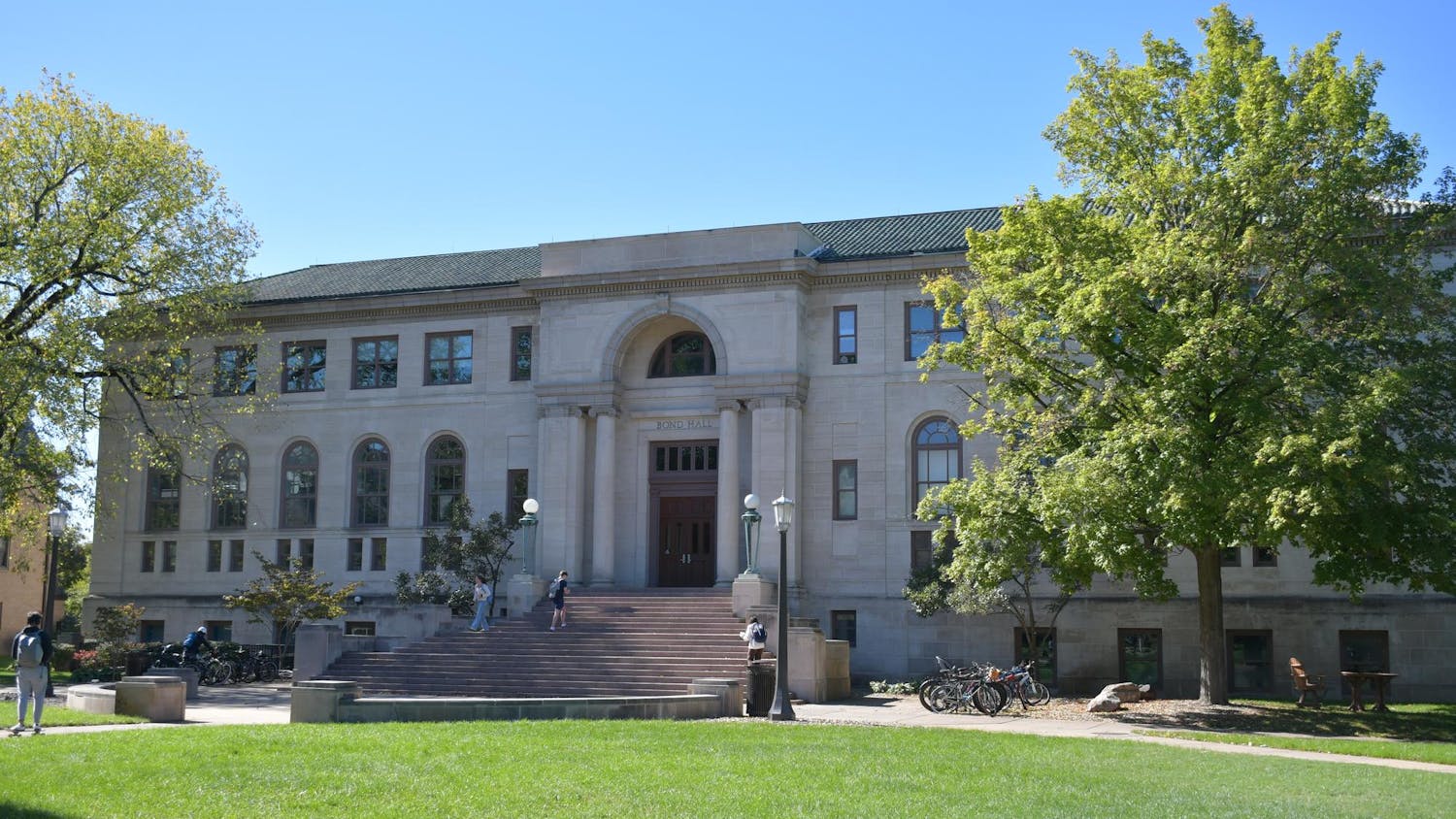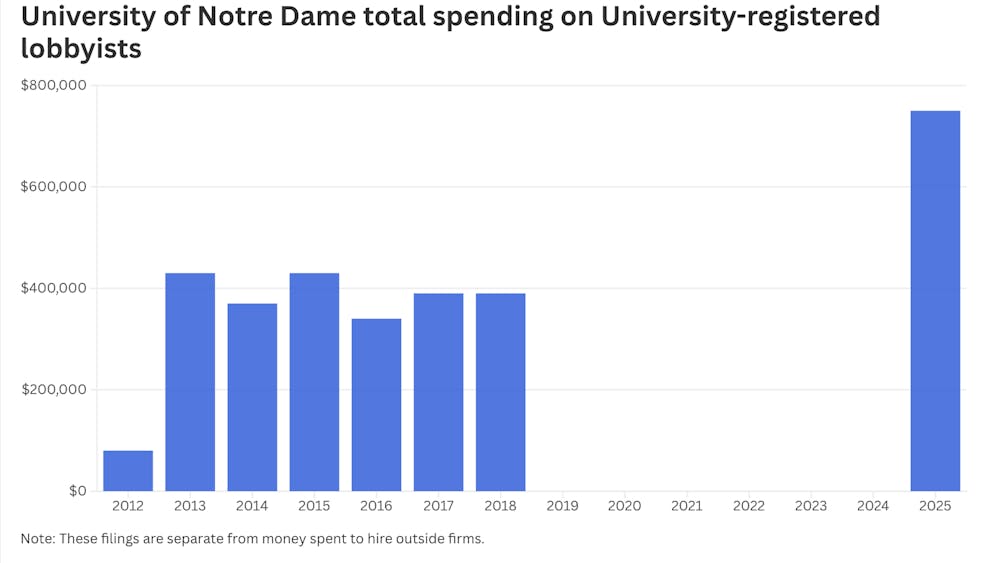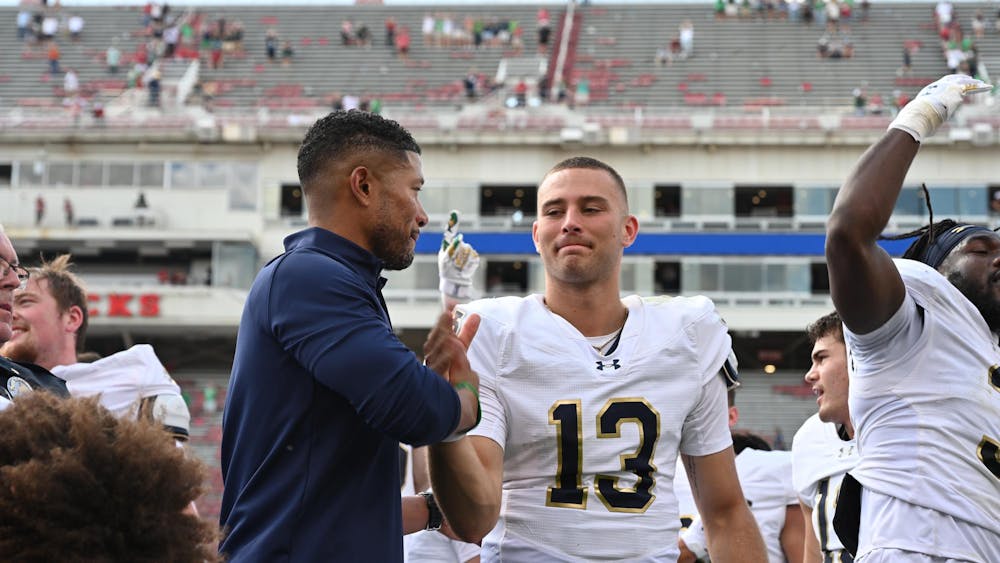Ross Douthat, author and New York Times columnist, spoke on the evolution of religious liberty in America since the Second Vatican Council on Wednesday afternoon in Decio Theatre of the DeBartolo Performing Arts Center. The event was part of the 2015-2016 Notre Dame Forum, which is titled “Faith, Freedom and the Modern World: 50 Years After Vatican II.”
Douthat said he looked to the Second Vatican Council’s declaration on religious freedom, "Dignitatis Humanae," to track the evolution of the Church’s attitude toward religious liberty.
“[It] formally established the Roman Catholic Church’s support for religious liberty and developed the Church’s teaching to the point where it was no longer deemed necessary for Catholics to argue for a preferential, state-established position for the Catholic Church in countries around the world,” he said.
Although the document was written in Rome, Douthat said, the “crucial transformative voices” that crafted "Dignitatis Humanae" were American. Furthermore, American Catholicism gave an example of the positive relationship the Church could enjoy with the government.
“Anyone looking for evidence 50 years ago that the Church had nothing to fear from dropping its call for a preferential position for Catholicism could look to the United States, could look to Notre Dame, and be immediately reassured that the Church could flourish, absent such patronage,” he said. “And anyone looking for evidence that one form of liberalism, liberal democracy at least, could be trusted to protect the Church’s freedoms, rather than perpetually going against it … could likewise look to America and could find what looked like very solid proof of concept.
“So while a document like 'Dignitatis Humanae' had still been imaginable without the American example, and the arguments that undergirded it might still have resonated as Catholics tried to grapple with twentieth century realities, politically, theology can only be so abstract. It ultimately needs a reference point in actual existing politics. … Having the American example made an immense difference in the debates, its outcomes, and the document and teaching itself.”
Douthat said in contemporary times, the American Catholic consensus that the Church can flourish in the liberal democratic experiment is fracturing.
“One crack is showing up a little on the Catholic left. In the age of Pope Francis, the current pontiff’s scathing criticism of global capitalism and the American-led world order has maybe started to encourage a more radical Catholic left critique of the American system than we have seen since probably the Vietnam era,” he said. “On the Catholic right, especially maybe the younger Catholic right, there’s an increasingly felt tension between being American and being Catholic, stronger even lately than some of the tensions created by Roe v. Wade. And this tension is emerging for a reason that’s relevant for the specifics of 'Dignitatis Humanae,' one of the elements of religious liberty that that document deemed essential to the political order — the idea that freedom of religion encompasses the freedom of the religious community.”
The guarantee of corporate religious freedom is no longer apparent, Douthat said, citing recent attempts by the U.S. Department of Health and Human Services to enforce mandates of contraception on Catholic institutions, as well as ACLU lawsuits against Catholic hospitals.
“What all of these examples have in common, in addition to the connection to the sexual revolution, is that they represent places where state pressure is being brought to bear not on Catholicism as embodied at Mass on Sunday, but on Catholicism as a corporate identity, Catholicism as the impetus and organizing idea behind the institutions which seek to serve the common good,” he said. “In each case, and perhaps more as time goes by, the Church is being told that trying to serve others is not sufficient, that Catholics must accept that the price maybe of their most basic ministry is to accept a secular definition of the common good and be governed in certain ways by secular power rather than the constitution of the Church.”
Douthat said the Catholic Church in America has been weakened in the last fifty years, as evidenced by declining Mass attendance and a decrease in religious vocations, yet the Church maintains a distinctive place in American politics.
“The Church is still large enough, still potent enough, still intellectual enough to have many — to be frank — enemies, who would like to see it weakened or brought low, meaning that Catholics are not or not yet the quirky, marginal, Amish-style religious minority that tends to be tolerated and accommodated very easily under secularism. But at the same time, the Church is too weakened, divided, possibly declining certainly in some cases to effectively fight its battles when those enemies circle or attack.”
Religious liberty protections are often unnecessary for the stronger religious groups, and easy to extend to the weaker religious groups, Douthat said.
“It’s the weakened, but still important, institutions in between that are more likely to see their protections shrink, and that’s roughly where the Church has found itself today,” he said.
Douthat said many who want to restrict the Church’s religious liberties do not view Christianity itself as problematic, but instead identify the problem as one set of issues, where traditional Christian teaching is not compatible with contemporary views on human rights.
“So in this sense, many people who support what I think are real restrictions on religious liberty see themselves as operating in the space of reasonable regulation allowed for by 'Dignitatis Humanae' itself, in the passage where the council fathers noted that religious liberty is still subject to certain regulatory norms,” he said. “And many even see themselves ultimately as friends to Catholicism and Christian religions, offering a kind of construction pressure and constructive criticism, a helping hand into sexual modernity — one that will be eventually vindicated by a third or fourth Vatican council, at which point Catholic resistance today will look a little silly."
Many Catholics agree with these opinions, Douthat said, and the best defense of religious liberty should focus on religious pluralism, rather than on religious liberty itself.
“The part of 'Dignitatis Humanae' that matters most in America right now is again the document’s stress on the corporate nature of religious freedom,” he said. “And to the extent that Catholics are hoping to persuade people outside the Church that something important in American life is threatened in the current religious liberty debate, they need to press the case that this kind of communal freedom, this associational freedom, is essential to the American experiment as we know it. And if it gives way to a strictly individualistic understanding of religious liberty, something precious will have been lost.”
Religious pluralism is not a threat to liberal values, Douthat said, but a complement to a liberal democracy.
“A healthy pluralism allows people of any persuasion, secular or religious, progressive or conservative, to build a culture with a sense of mission, a place where certain ideas are generally accepted or taken for granted, certain organizing principles are assumed,” he said. “And at the same time it’s telling them that they have to do this within their own private institutions, rather than aspiring to impose their ideas on a grander, society-wide scale.”
Douthat said the tensions between the Church and the wider culture should also serve as a reminder that the Church does not have a permanent political home.
“Even as we seek to preserve that congruence between the American order and Catholic freedom that inspired so much optimism in 1965, we should also not to expect it to last indefinitely,” he said. “We should realize that liberal democracy, like all political orders, is time-bound and contingent, and not the ultimate good that the Church is called to preach.
As American attitudes toward religious liberty evolve, the Church must be prepared to adapt and move forward, Douthat said.
“If a synthesis between being American and being Catholic, which seemed to be getting easier in the 1960s and may be getting more difficult today, we should be challenged but not necessarily troubled by that change,” he said. “‘Heaven and earth shall pass away,’ Jesus said ‘but my words shall not pass away.’ But he was not talking about the U.S. Constitution.”
Read More
Trending









